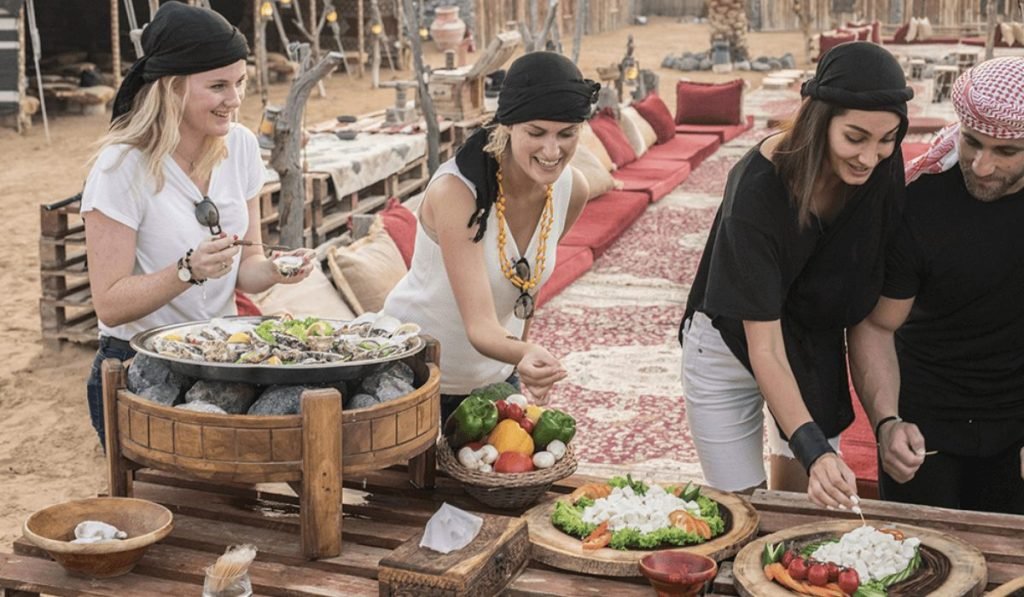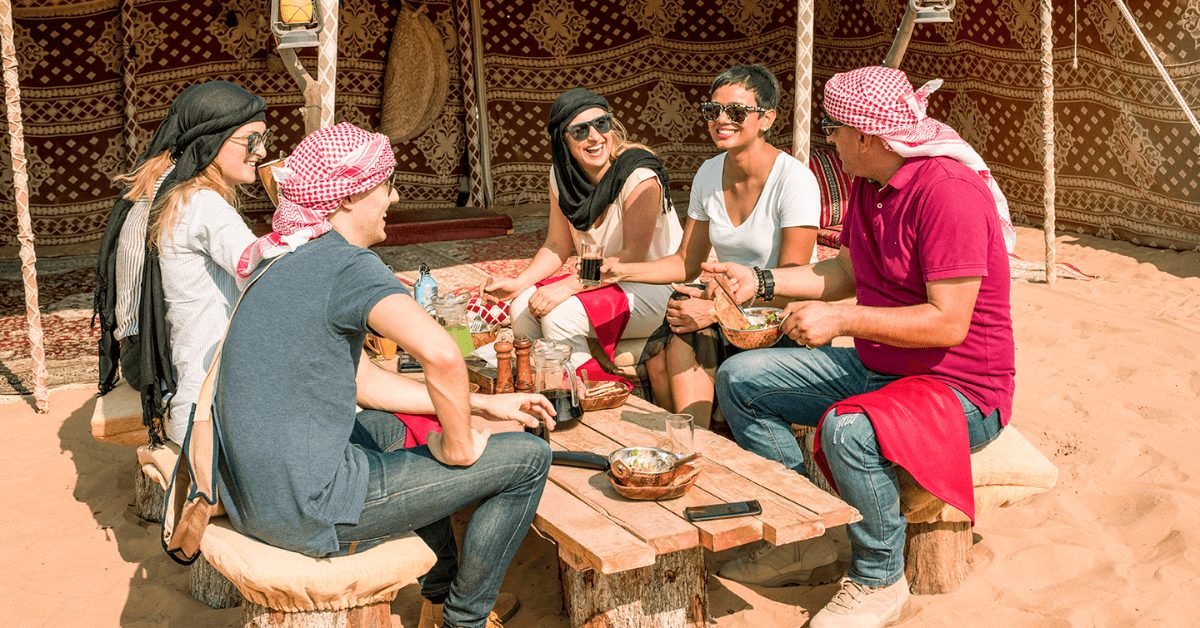Dubai, the vibrant and cosmopolitan city in the United Arab Emirates, offers visitors a plethora of experiences. One aspect that should not be missed is the opportunity to indulge in Emirati cuisine, which reflects the rich cultural heritage of the region. Particularly during a desert safari in Dubai, travelers can immerse themselves in the authentic flavors and culinary traditions that have shaped Emirati gastronomy.
Traditional Emirati Dishes
Emirati cuisine boasts a range of traditional dishes that are a true delight for the senses. One such dish is shawarma, a popular street food made with succulent slices of marinated meat, typically chicken or lamb, which are then wrapped in freshly baked Arabic bread and garnished with pickles, vegetables, and flavorful sauces. The combination of tender meat and aromatic spices creates a mouthwatering experience.

Another must-try dish is machbous, a fragrant rice dish cooked with a blend of spices, including saffron, turmeric, and black lime. It is often prepared with either chicken, fish, or shrimp, and its rich flavors and colorful presentation make it a true centerpiece of Emirati cuisine.
For those with a sweet tooth, luqaimat is a delectable choice. These bite-sized dumplings are deep-fried to golden perfection and drizzled with date syrup or honey. The contrasting textures of the crispy exterior and soft, pillowy interior make luqaimat an irresistible treat.
Harees, a hearty porridge made with cracked wheat and slow-cooked meat, is a dish traditionally served during Ramadan. Its creamy consistency and comforting flavors make it a popular choice for both locals and visitors alike.
Another noteworthy dish is ghazi, a roasted lamb served on a bed of fragrant rice mixed with nuts and raisins. The tender meat, combined with the aromatic spices, creates a truly satisfying culinary experience.
Influences on Emirati Cuisine
Emirati cuisine has been shaped by a variety of influences, resulting in a unique blend of flavors and cooking techniques. The nomadic Bedouin culture, with its focus on simple yet nourishing meals, has had a significant impact on the cuisine. Bedouins relied on ingredients that could withstand the harsh desert environment, such as dates, camel meat, and rice.
Arab, Persian, and Indian culinary traditions have also played a pivotal role in shaping Emirati cuisine. The Arab influence is evident in the widespread use of fragrant spices like saffron, cardamom, and cinnamon, which add depth and complexity to the dishes. Persian and Indian influences can be seen in the use of ingredients like rosewater, dried fruits, and aromatic herbs.
Dining Experience at a Desert Safari
When embarking on a desert safari in Dubai, visitors can expect not only a culinary feast but also a memorable dining experience. The traditional Majlis setting, a cozy seating arrangement on Persian carpets and cushions, offers a unique and authentic ambiance. This traditional setting encourages guests to relax and enjoy the company of friends and family while savoring the flavors of Emirati cuisine.
Authentic Emirati hospitality is a hallmark of the dining experience during a desert safari. Warmth and generosity are at the core of Emirati culture, and this is reflected in the way meals are served. Visitors can expect to be greeted with a selection of traditional snacks and beverages upon arrival, creating an atmosphere of genuine hospitality.
Throughout the meal, cultural performances take place, providing entertainment and insight into the rich heritage of the region. Traditional music, dance, and even falconry displays are common during these dining experiences, adding to the overall enjoyment of the evening.
Vegetarian and Vegan Options
For vegetarian and vegan travelers, Emirati cuisine offers a range of delightful options. One such dish is falafel, which consists of deep-fried balls or patties made from ground chickpeas or fava beans. These flavorful bites are often served with tahini sauce and a variety of fresh salads.
Another popular vegetarian choice is mountable, a creamy and smoky eggplant dip. Made with roasted eggplant, tahini, garlic, and lemon juice, this dip is perfect for spreading on warm Arabic bread or enjoying crisp vegetables.
Vegan-friendly options include Salona, a hearty vegetable stew made with tomatoes, onions, and an assortment of fresh vegetables, and Fatayer, a savory pastry filled with spinach, onions, and sumac. These dishes showcase the diverse range of flavors and textures available in Emirati cuisine.
Fusion and Modern Emirati Cuisine
While traditional Emirati cuisine holds a special place in the hearts of locals, the culinary scene in Dubai has also embraced fusion and modern interpretations of Emirati dishes. Chefs have taken traditional recipes and added contemporary twists, resulting in innovative flavor combinations and stunning presentations.
For example, a popular fusion dish is camel sliders, where tender pieces of camel meat are served on mini buns with a variety of unique toppings and sauces. This playful take on a traditional ingredient showcases the creativity and ingenuity of Dubai’s culinary scene.
Modern Emirati cuisine also emphasizes the use of high-quality local ingredients and innovative cooking techniques. Chefs are utilizing modern cooking equipment and methods to enhance the flavors while preserving the essence of traditional Emirati dishes.
Importance of Local Ingredients
Emirati cuisine places great importance on utilizing local and seasonal ingredients. The Arabian Gulf provides an abundance of fresh seafood, including a hammer, a local fish that is highly regarded for its delicate flavor and firm texture. The proximity to the Gulf allows for a steady supply of fresh seafood to be incorporated into Emirati dishes.
Dates, a staple in Emirati cuisine, are another vital ingredient. They are used in both savory and sweet dishes, adding natural sweetness and depth of flavor. Dates are often enjoyed as a standalone snack or used in desserts and traditional beverages.
One unique aspect of Emirati cuisine is the use of camel meat. Camel is a lean and nutritious meat that has been consumed by Bedouins for centuries. In traditional dishes such as madrooba, camel meat is slow-cooked with a blend of spices and served with rice, creating a dish that is both flavorful and hearty.
Emirati Beverages
Emirati cuisine is accompanied by a selection of traditional beverages that perfectly complement the flavors of the dishes. One such beverage is gahwa, a traditional Arabic coffee that is both aromatic and invigorating. Served in small cups, gahwa is often enjoyed with dates, symbolizing the warmth and hospitality of Emirati culture.
Dates, apart from being a significant ingredient in Emirati cuisine, are also used to create refreshing beverages. One popular example is the date smoothie, made by blending fresh dates with milk or yogurt. This creamy and naturally sweet drink is a delightful way to cool down in the desert heat.
Jallab is another refreshing drink commonly served during meals. Made from a blend of grape molasses, rose water, and pine nuts, jailed offers a unique combination of flavors that tantalize the taste buds.
Culinary Workshops and Experiences
For those looking to delve deeper into the world of Emirati cuisine, Dubai offers a range of culinary workshops and experiences. These immersive activities provide an opportunity to learn traditional Emirati cooking techniques and engage in hands-on food preparation.
Participants can discover the secrets behind crafting dishes like maqamat, where they will be guided by expert chefs in the art of deep-frying and perfecting sweet dumplings. These workshops provide a fun and educational experience, allowing participants to gain a deeper understanding of Emirati culinary traditions.
Food Etiquette and Customs
Understanding the cultural norms and dining etiquette is crucial when experiencing Emirati cuisine. Emiratis place great importance on hospitality and respecting guests. When dining in an Emirati setting, it is customary to remove your shoes and sit cross-legged on the floor, as this signifies a gesture of humility and respect.
When enjoying a meal, it is customary to use your right hand for eating. Emiratis traditionally eat with their hands, using pieces of Arabic bread to scoop up food. This communal style of dining fosters a sense of togetherness and creates a warm and convivial atmosphere.
Health Benefits of Emirati Cuisine
Emirati cuisine offers several health benefits, thanks to the use of fresh ingredients and balanced meals. Many traditional Emirati dishes incorporate a variety of vegetables, legumes, and whole grains, providing a good source of fiber and essential nutrients.
The spices commonly used in Emirati cuisine, such as turmeric and cardamom, offer numerous health benefits. Turmeric, known for its anti-inflammatory properties, can help support a healthy immune system, while cardamom aids digestion and promotes overall gastrointestinal health.
Moreover, the emphasis on using natural ingredients and minimal processing contributes to a nutritious and wholesome dining experience. By choosing traditional Emirati dishes, visitors can savor delicious flavors while nourishing their bodies.
Sustainable Practices in Emirati Cuisine
Emirati cuisine is increasingly embracing sustainable practices to minimize environmental impact. With a focus on local and seasonal produce, restaurants and chefs are promoting the use of ingredients that are readily available and have a lower carbon footprint.
By supporting local farmers and suppliers, Emirati cuisine helps foster a sense of community and sustainability. Additionally, efforts are being made to reduce food waste by implementing efficient storage and portion control practices.
Through these sustainable initiatives, Emirati cuisine not only provides a memorable culinary experience but also demonstrates a commitment to preserving the environment and supporting local ecosystems.
Emirati Desserts and Sweets
No culinary journey through Emirati cuisine would be complete without exploring the delightful array of desserts and sweets. Umm Ali, a traditional bread pudding made with layers of flaky pastry, nuts, and creamy custard, is a dessert that embodies indulgence and comfort.
Luqaimat mentioned earlier as a sweet dumpling, is a dessert that deserves its own spotlight. These golden-brown balls of dough, often garnished with sesame seeds and drizzled with date syrup, are a favorite among locals and visitors alike.
Esh Astray, a creamy and velvety dessert made with vermicelli noodles, milk, and a touch of rose water, offers a delightful end to any Emirati meal. The fragrant aroma and delicate flavors make it a dessert worth savoring.
Exploring Emirati Cuisine in Dubai
Dubai is home to a vibrant culinary scene that showcases the best of Emirati cuisine. Local restaurants and eateries offer an array of traditional dishes, ensuring that visitors can experience the authentic flavors of the region.
For a more immersive experience, specialized food tours and culinary experiences are available. These guided tours allow participants to explore local markets, sample a variety of dishes, and learn about the cultural significance behind each recipe. It is an opportunity to engage with local vendors, chefs, and food enthusiasts, gaining insights into the nuances of Emirati cuisine.
Conclusion
Emirati cuisine, with its rich flavors and cultural heritage, is an integral part of the Dubai experience, particularly during a desert safari. From traditional dishes that showcase the region’s history to fusion creations that push culinary boundaries, Emirati cuisine offers a delightful journey for the taste buds. By embracing sustainable practices and utilizing local ingredients, Emirati cuisine not only satisfies the palate but also promotes a sense of community and environmental consciousness.

